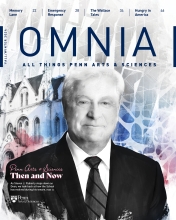The Department of Middle Eastern Languages and Cultures (MELC) is the new name for the Department of Near Eastern Languages and Civilizations (NELC). After a lengthy discussion by faculty, lecturers, and staff, as well as consultation with graduate and undergraduate students, the department voted in December 2022 in favor of changing its name, and the change became official on July 1, 2024.
“Although the change of N to M in the acronym may seem minor,” says Professor Josef Wegner, department chair, “the broader recognition of the ‘Middle East’ over the more restrictive ‘Near East’ was considered a better fit for the numerous cultures and languages encompassed by teaching and research in the department.”
In addition, the word “civilizations” did not adequately reflect the tremendous historical and social complexity of the Middle East over thousands of years, or how that is represented in research and teaching at Penn, adds Professor Paul Cobb. “The word suggests that only those social groups that can be designated ‘civilized’ are worthy of study and does not signal our interests in, for example, nomadism, animals, rural life, or languages and literatures outside courtly or elite spheres,” he says.
The change to “cultures” recognizes this complex variety of human experience in the broader Middle East, as well as the focus of the department on teaching both ancient and modern languages. Research and courses cover the region from North Africa and the Iberian Peninsula through the eastern Mediterranean to Iran and Arabia, as well as social and cultural development from ancient to modern times.
“Our faculty teach and research on diverse disciplines across the ancient, medieval, and modern periods that include language, literature, archaeology, anthropology, philology, historic preservation, religion, philosophy, history of art, history, folklore, legal history, and cinema and media studies, to name the most prominent,” Wegner says. The department offers ancient languages including Sumerian, Akkadian, Biblical Hebrew, and Egyptian, as well as modern languages including Persian, Turkish, Hebrew, Arabic, and Kurdish.
“In its history, our department has had many names,” Cobb says. “One of the lessons we learned through this process is that no name is perfect. But MELC resulted from a slow and consultative process and, better than any other name, communicates to as broad an audience as possible what this fantastic department does.”



